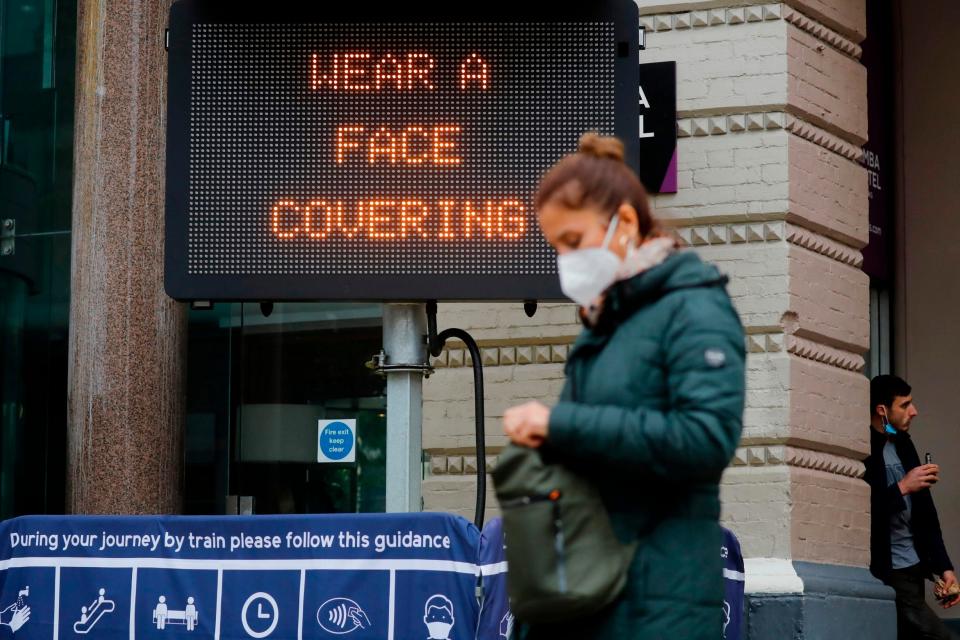Second lockdown now likely as minister George Eustice says current approach right 'for now'

A new Covid-19 lockdown covering much of Britain looked increasingly likely today after a Cabinet minister called the current approach right “for now”.
As senior scientists warned of hospitals being overwhelmed with 25,000 coronavirus patients by the end of November, expectations were growing that Boris Johnson will reluctantly have to order a temporary major shutdown before the end of the year.
Environment Secretary George Eustice kept the door open to such a move when asked about reports that the Government was being driven towards a “circuit breaker”.
“We think we have got the right approach for now,” the minister told Sky News.
In key developments as European leaders ordered new emergency measures:
President Emmanuel Macron of France was widely expected to announce a return to lockdown in an attempt to rein in an explosion of cases during a television broadcast tonight to his nation.
German Chancellor Angela Merkel was pressing for a partial lockdown in talks with governors after the number of newly recorded infections in the country hit a record high for that country of nearly 15,000.
Professor Sir Mark Walport, a member of the UK Government’s Sage (Scientific Advisory Group for Emergencies), said it was not “unrealistic” that the number of people in hospital with Covid-19 could more than double to 25,000 by the end of November, making more fatalities inevitable.
Hospitals reported being forced to cancel some treatments. Nottingham postponed four cancer operations this week due to “pressure on intensive care units”. Airedale Hospital, near Keighley, West Yorkshire, said it is suspending non-urgent surgery for two weeks. “This is not a decision we take lightly,” it said.
Labour stepped up leader Sir Keir Starmer’s demands for a UK-wide circuit-breaker lockdown. Health spokesman Jonathan Ashworth told the Standard: “It appears that ministers are squabbling behind the scenes. The Prime Minister needs to get a grip because the crisis is out of control.”
New data shows every borough in London has seen their coronavirus rate rise above the key threshold of 100 new cases a week per 100,000 people, though this level is still significantly below the worst hotspots in the country. Three are above a 200 rate, Ealing, Hammersmith & Fulham and Kingston.
Conservative peer Lord (David) Willetts, of the Resolution Foundation, said the prospects now for finding new employment once someone became unemployed was “even worse” than after the 2008 financial crash, with young people in particular being hit.
About one in five young people who have been on the furlough scheme have gone on to lose their jobs... compared with one in 10 overall,” he explained.
The former head of the Government’s Troubled Families unit, Dame Louise Casey, warned of a “really rough winter” for many families. On the Marcus Rashford campaign to extend free school meals during holiday time, she added: “That’s just a slam dunk if you want to tackle this issue.”
The latest official figures showed 367 deaths, the highest daily increase in five months, and six times higher than the daily death toll of 54 announced on 23 March when the national lockdown began. However, Tuesday data publications include a “catch-up” from the weekend and should be treated with caution.
Sir Mark said better treatments could reduce the fatality rate compared with the first wave in spring. “One of the differences of course is that we are better at looking after people with coronavirus now and so hopefully the case fatality rate will be lower than it was in the first wave,” he told BBC Radio 4’s Today programme.
“But at the end of the day the fatality rate, the number of people who die is a product of the number of people who are infected and their vulnerability.”
No 10 admitted the latest infection figures were “concerning” adding: “Which is why we have introduced stronger measures to curb the spread of the virus in the areas where it is most prevalent.”
In a round of interviews, Mr Eustice stressed that a national lockdown was not needed because areas like his own Cornish constituency had much lower infection rates than cities like Manchester and Liverpool subject to Tier 3 curbs.
He also defended the refusal to have a circuit breaker over half-term, which Labour demanded, saying Sage themselves had said it was uncertain to work and could cause “lots of negative consequences” to health and the economy.
“So we’re trying to intervene in things in a proportionate way across the country, but we don’t think it’s appropriate to have a national lockdown, because there’s parts of the country, like Cornwall, where the incidence of the disease is actually very low.”
Britain’s health service is currently less strained than the French system, which about 2,500 patients are in intensive care units, around half their capacity. The UK has about 850 ICU beds occupied.
Swiss hospitals are bringing back retired staff to replace sick frontline workers, amid warnings they are 10 days from breaking point.
Mrs Merkel’s numbers are much lower but Mrs Merkel was said to be proposing a four-week lockdown.
Read more
UK lockdown looming as all London boroughs hit key cases mark-LIVE
50,000 young Londoners forced onto benefits due to job fallout
Lockdowns loom in France and Germany as cases surge
London councils draw up own Tier 2 exit plan
Dr Rosena Allin-Khan: Covid is a mental health crisis too
Covid-19 rates top 100 cases per 100,000 in every London borough

 Yahoo News
Yahoo News 